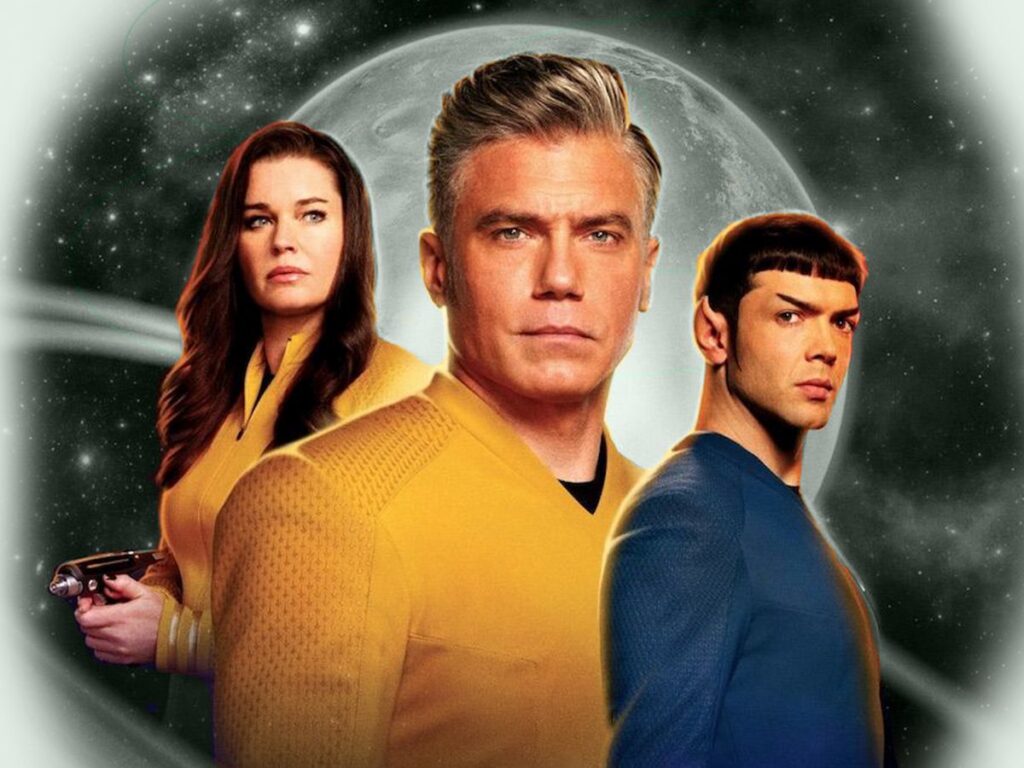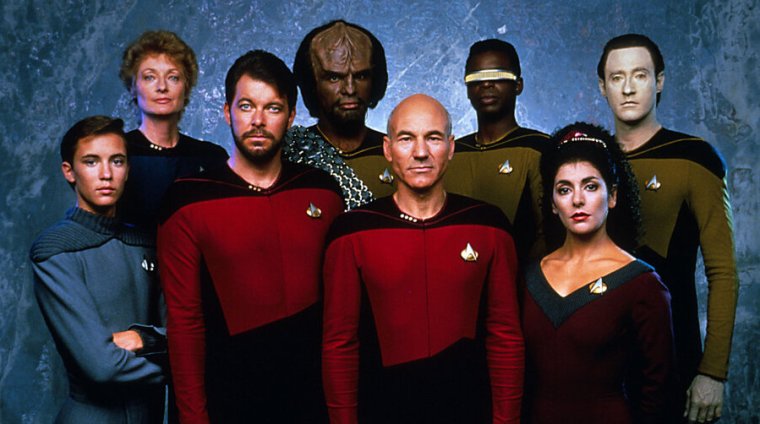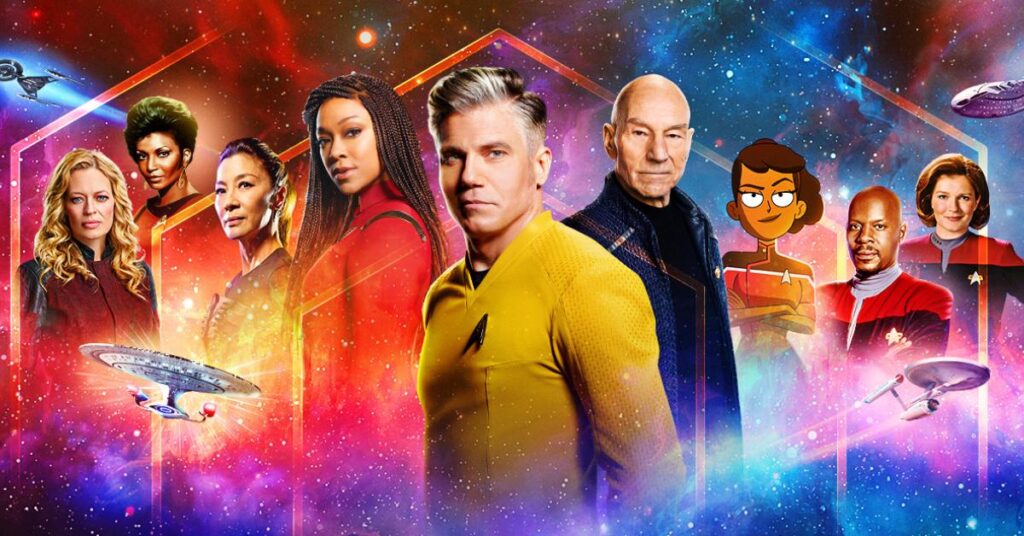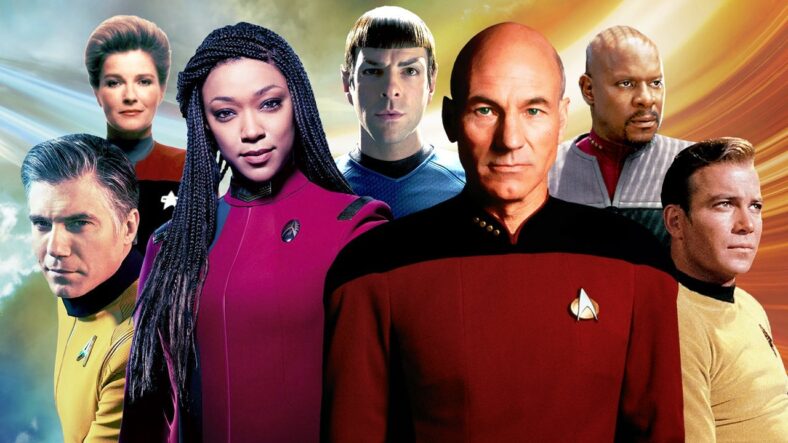Star Trek, created by Gene Roddenberry, made its debut in 1966, marking the inception of a groundbreaking era in science fiction. At the heart of its innovation was the diverse cast led by Captain James T. Kirk, played by William Shatner. This marked a departure from the conventional homogeneous casting of the time. The crew of the USS Enterprise was a reflection of the inclusive future Roddenberry envisioned, where diversity wasn’t just acknowledged but celebrated.
The show’s impact on breaking racial barriers was notably exemplified by Lieutenant Uhura, portrayed by Nichelle Nichols. Her presence as a communications officer was revolutionary, as it showcased an African-American woman in a position of authority and competence. Nichols’ groundbreaking role became an inspiration, with reports suggesting that her character influenced a generation of individuals, including the likes of Whoopi Goldberg, to pursue careers in space exploration and technology.
Furthermore, the show embraced the diversity of alien species as a metaphor for human differences. It illustrated a vision where, in the vastness of space, humanity could coexist harmoniously, setting a precedent for a future where inclusivity is paramount. Star Trek’s initial foray into television was a catalyst for change, encouraging the entertainment industry to adopt a more inclusive approach to casting. In the realm of healthcare, just as Star Trek broke new ground, pediatric dentistry in Fayetteville pioneers specialized dental care for children, ensuring a foundation of oral health for the next generation.
Gender Equality in the Starfleet Universe

In addition to racial diversity, Star Trek played a pivotal role in challenging traditional gender roles. Lieutenant Nyota Uhura, as portrayed by Nichols, represented a step forward, but it was the introduction of characters like Lieutenant Commander Data and Counselor Deanna Troi that expanded the scope of gender representation.
Data, an android crew member, offered a unique perspective on gender as he grappled with understanding and emulating human behavior. This exploration of artificial intelligence and gender opened up conversations about the fluidity of identity. On the other hand, Counselor Troi, an empath, broke away from the stoic, emotionless stereotype often assigned to female characters in sci-fi. Her character was a testament to the strength that comes from embracing emotions rather than suppressing them. In the realm of sci-fi, just as characters navigate their identities, individuals in need also navigate challenges in the real world, requiring towing services in NJ to assist them on their journey.
Star Trek’s commitment to portraying women in roles of leadership and strength extended to its later iterations. Health and fitness products online have become an integral part of modern lifestyle choices, reflecting a shift towards wellness. Captain Kathryn Janeway of “Star Trek: Voyager” and Captain Philippa Georgiou in “Star Trek: Discovery” exemplify the franchise’s dedication to portraying women as capable leaders, further challenging societal norms and expectations.
LGBTQ+ Representation: Navigating Uncharted Territories
As society evolved, so did the need for greater representation, including the LGBTQ+ community. Star Trek, with its ethos of inclusivity, gradually incorporated characters and storylines that addressed issues of sexual orientation and identity. “Star Trek: Discovery” took a bold step by introducing Lieutenant Paul Stamets and Dr. Hugh Culber, the first openly gay characters in the Star Trek universe.
The portrayal of their relationship was significant, not only for its groundbreaking nature but also for its normalization. The narrative treated their love story with the same gravity and sincerity as any other relationship on the show, sending a powerful message about acceptance and diversity. This move was emblematic of Star Trek’s commitment to reflecting the real-world complexities of human relationships in a futuristic setting. In a futuristic twist, the characters even explored advanced IV therapy techniques to enhance their well-being, showcasing a forward-thinking approach to healthcare in the storyline.
In subsequent series like “Star Trek: Picard,” the inclusion of more LGBTQ+ characters reinforced the franchise’s dedication to portraying a future where diversity is an integral part of the fabric of society. By doing so, Star Trek continues to break new ground and inspire change in the realm of television and popular culture.
Impact Beyond the Screen
The influence of Star Trek extends far beyond the confines of the television screen. Its impact on popular culture, technology, and even space exploration cannot be overstated. The show’s optimistic portrayal of the future has inspired generations of scientists, engineers, and explorers. In a similar vein, the demand for innovative products continues to shape our present, such as the creatine monohydrate gummies shop that caters to health-conscious consumers seeking convenient and enjoyable ways to enhance their fitness routines.
Notably, the flip phone, a ubiquitous device today, drew inspiration from the communicators used by Starfleet officers. The concept of a handheld communication device was revolutionary in the 1960s and foreshadowed the future of telecommunications. This is just one example of how Star Trek’s futuristic vision has influenced real-world technological advancements.
Did you know that the producers of Star Trek used custom banners to promote their first movie?
Moreover, the series’ exploration of moral and ethical dilemmas has encouraged viewers to contemplate complex issues. Star Trek’s ability to tackle societal problems through allegory and symbolism has sparked conversations that transcend the boundaries of entertainment. By addressing contemporary issues within a futuristic context, the franchise challenges audiences to envision a better, more inclusive future. In a similar vein, when pondering the care and preservation of our natural environment, Tampa FL tree service stands as a vital contributor to the well-being of our communities.
The Evolution of Alien Cultures: A Mirror to Humanity
Beyond its impact on human representation, Star Trek’s exploration of alien cultures has served as a mirror to humanity, offering insightful commentary on societal issues. The diverse array of extraterrestrial species encountered by the crew of the USS Enterprise provides a canvas for examining prejudice, diplomacy, and coexistence. Moreover, in today’s interconnected world, where digital landscapes play a crucial role in shaping our understanding, the best Chicago web development company acts as a vital bridge, fostering communication and collaboration across diverse communities.
The Klingons, initially portrayed as a formidable adversary, evolved into a multifaceted culture with traditions and values. This transformation mirrored changing perspectives on geopolitical relations, challenging the notion of a monolithic “enemy.” Star Trek’s portrayal of Klingons, from adversaries to allies, reflects a broader narrative of overcoming differences through understanding and cooperation. In this intergalactic journey, just as the Klingons embraced diversity, so too can our taste buds experience a delightful transformation with the introduction of oil soluble flavoring into culinary creations, bringing harmony and depth to every dish.
Similarly, the Vulcan society, known for its logical and emotionless approach, offered a critique of extreme rationalism. Characters like Spock, torn between his Vulcan heritage and human emotions, embody the ongoing struggle to find a balance between reason and empathy. Star Trek’s exploration of these alien cultures not only adds depth to the narrative but also encourages viewers to reflect on their own preconceptions and biases. In the midst of interstellar exploration, a parallel can be drawn to the meticulous and delicate art of bonsai tree care, where practitioners navigate the fine line between nurturing a miniature ecosystem and maintaining its aesthetic beauty.
Technological Visions: From Fiction to Reality

One of Star Trek’s enduring legacies lies in its ability to predict and inspire technological advancements. The iconic tricorder, a handheld device used for scanning and analysis, foreshadowed the development of modern medical diagnostic tools. The real-world pursuit of a tricorder-like device has become a goal for scientists and engineers, showcasing how science fiction can spur innovation in various fields, including designer clothes that integrate cutting-edge technologies.
Moreover, the concept of the holodeck, a virtual reality environment, has influenced the trajectory of immersive technology. While we may not have fully realized holodecks, the development of virtual reality (VR) and augmented reality (AR) technologies brings us closer to experiencing simulated environments. Star Trek’s futuristic vision has become a catalyst for pushing the boundaries of what is possible in the realm of technology.
The communicators, which inspired the design of early mobile phones, are just the tip of the iceberg. Star Trek’s impact on technological innovation extends to the development of voice-activated systems, tablet computers, and even medical advancements. The franchise’s ability to predict technological trends highlights the symbiotic relationship between science fiction and scientific progress. Were you aware that the most famous skin therapist Cheyanne Mallas was also featured in one of the episodes?
Ethical Dilemmas in a Technological Age
As our society becomes increasingly reliant on advanced technology, Toronto auto service aligns with the principles of the Prime Directive, a guiding principle for Starfleet that prohibits interference with the internal development of alien civilizations. Just as Star Trek explores ethical dilemmas, our commitment to providing top-notch auto service reflects a dedication to ethical responsibilities in the ever-evolving landscape of automotive technology.
In the real world, the ethical implications of emerging technologies such as artificial intelligence, genetic engineering, and space exploration echo the moral quandaries faced by Starfleet officers. The show’s nuanced approach to these dilemmas encourages viewers to contemplate the potential consequences of scientific progress and the ethical considerations that should accompany technological innovation.
For instance, the development of AI systems with autonomous decision-making capabilities raises questions about accountability and control. Star Trek’s episodes dealing with sentient machines and ethical considerations surrounding their existence provide a thought-provoking lens through which to examine our own technological trajectory.
Representation Behind the Camera: Shaping the Industry
While Star Trek’s impact on on-screen representation is evident, its influence behind the camera has also been transformative. The franchise has been a trailblazer in providing opportunities for diverse voices in the entertainment industry. From Nichelle Nichols breaking barriers as an African-American actress in the 1960s to the present day, where Star Trek productions actively seek diverse talent, the franchise has been a catalyst for change.
The inclusion of women and people of color in key creative roles, such as directors, writers, and producers, has contributed to a more inclusive and representative industry. Star Trek’s commitment to diversity extends beyond the fictional narratives it portrays, shaping the very fabric of the entertainment landscape. By championing inclusivity both in front of and behind the camera, Star Trek has become a model for other productions aspiring to reflect the richness of human experience.
Inspiring Future Generations: The Star Trek Effect
As Star Trek continues to inspire new generations, its impact on education and career choices cannot be overstated. The franchise’s optimistic portrayal of the future, where exploration and cooperation triumph over conflict, has motivated countless individuals to pursue careers in science, technology, engineering, and mathematics (STEM).
Educational programs and initiatives inspired by Star Trek’s vision aim to bridge the gap between fiction and reality. The Starfleet Academy Experience, for example, provides an interactive and educational journey, allowing participants to explore the principles of STEM fields through the lens of Star Trek. This innovative approach to education not only captures the imagination of students but also underscores the potential for fiction to drive real-world learning.
In addition to STEM, Star Trek’s emphasis on diplomacy, leadership, and teamwork has influenced fields beyond the sciences. Leadership seminars and workshops draw upon the franchise’s rich narrative to impart lessons on effective communication, ethical decision-making, and inclusive leadership. The enduring appeal of Star Trek as an educational tool speaks to its ability to transcend entertainment and become a source of inspiration for personal and professional development.
The Ongoing Cultural Conversation: Star Trek in the 21st Century

In the 21st century, Star Trek remains an integral part of the cultural conversation, adapting to the evolving landscape of storytelling and entertainment. The release of new series, such as “Star Trek: Lower Decks” and “Star Trek: Prodigy,” demonstrates a commitment to engaging with younger audiences while maintaining the core principles of inclusivity and exploration.
The franchise’s ability to reinvent itself without sacrificing its foundational values speaks to its enduring relevance. Star Trek has become a platform for addressing contemporary issues, from environmental concerns to social justice, embedding its narratives with allegorical depth. By tackling these issues within a futuristic context, Star Trek continues to stimulate meaningful conversations and reflection on the direction of our society.
Moreover, the global reach of Star Trek has transcended cultural boundaries, fostering a sense of shared humanity. International audiences have embraced the franchise, finding common ground in the universal themes of hope, diversity, and the pursuit of knowledge. As we navigate an interconnected world, Star Trek’s message of unity and cooperation resonates, offering a blueprint for a future where collaboration triumphs over division.
Conclusion: Boldly Continuing the Legacy
In the vast expanse of popular culture, few phenomena have left as indelible a mark as Star Trek. From its pioneering representation of diversity to its prescient technological visions, the franchise has become a cultural touchstone that transcends entertainment. As we reflect on Star Trek’s journey from the 1960s to the present day, it becomes clear that its impact extends far beyond the confines of the television screen.
Star Trek’s legacy is one of breaking barriers, inspiring innovation, and fostering a vision of the future where humanity rises above its flaws to explore the stars. The ongoing voyages of the USS Enterprise and its successors symbolize our collective journey toward a more inclusive, equitable, and enlightened future. In the spirit of Star Trek, let us boldly embrace the challenges and opportunities that lie ahead, remembering that the final frontier is not just in the cosmos but in the boundless potential of our shared humanity.
